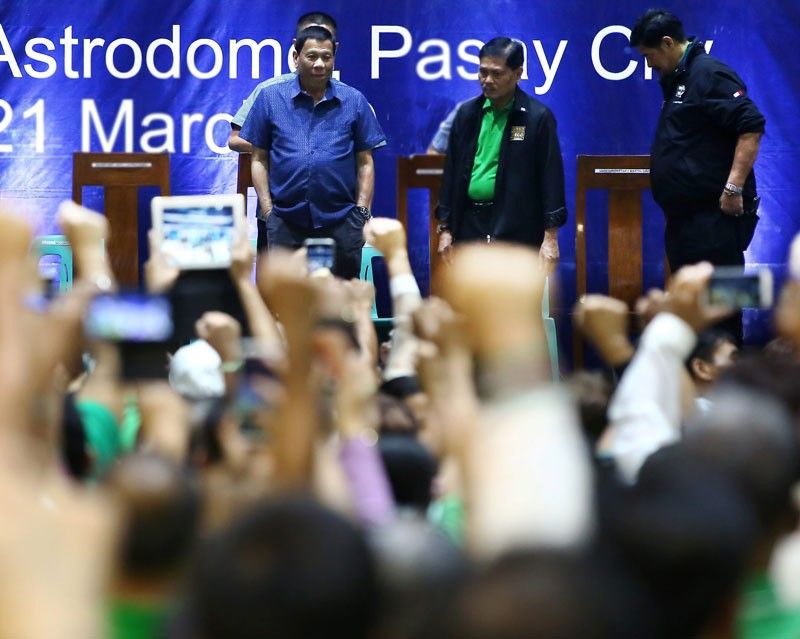‘Federalism still alive, feasible under Duterte’

MANILA, Philippines — Despite President Duterte’s declaration that the shift to federalism won’t happen under his term, the issue is not yet dead.
Former consultative committee (Con-com) spokesman Ding Generoso said the plan to change the form of government to federalism is still feasible within the last three years of the Duterte administration.
In an interview on One News’ “The Chiefs,” aired on Cignal TV Wednesday night, Generoso said that advocates of federalism are not giving up efforts for a shift in government.
He said the three remaining years of the Duterte government are sufficient for a people’s initiative or for Congress to amend the Constitution for federalism.
“We don’t want this issue to die. We have to keep it alive even if we have to go into another administration after three years,” Generoso said.
Former senator and Concom member Aquilino Pimentel Jr. said he is not losing hope even if Duterte seemed to have given up on federalism.
Pimentel said the President is only trying to set priorities that will grant powers to local government units (LGUs).
“The President is not abandoning the cause of federalism. He is just giving attention to ‘priority’ measures that would grant more powers to LGUs to develop their own areas of responsibility,” Pimentel told The STAR.
He said the Duterte administration has enough time to push the plan or until 2022 “to initiate specific proposals to speed up the development of the nation.”
Generoso echoed Pimentel’s statement, saying that a lot of things can still be done with the remaining three years of the Duterte administration for the shift to federalism.
An also-ran in the senatorial race, Generoso said he was not surprised by Duterte’s pronouncement as he had heard the same sentiment from senator-elect Bong Go that the shift to federalism is unlikely to happen during the present administration.
As in Duterte’s previous flip-flopping statements, Generoso said he is “trying to read between the lines” whenever the President speaks.
He said the shift to federalism should be pushed through, noting they have introduced reforms in the political system, judiciary, anti-political dynasty, anti-turncoatism, creation of democracy fund and socio-economic and environmental rights, among others.
But in case Duterte gives up on federalism, Generoso said that his political party and other groups including the “Hugpong Federal Movement of the Philippines” will push through with the people’s initiative.
“If they do not want to put it on the table, there is still an option and that is the people’s initiative,” Generoso said.
He said they are going for Charter change either by Congress or through people’s initiative.
Generoso expressed optimism that the President still favors a federal form of government even after admitting that it would not be realized under his term.
He said they would continue to convince the President that federalism is still possible under his term.
Generoso said the President probably did not submit a draft proposal for federalism because he is not convinced it would be passed by the 17th Congress.
“There are reasons why the President did not submit the draft. One is that there is only a year left in Congress and the six months would be devoted to tackling the budget. The other was that he was not confident he could secure the Senate vote,” he said.
“So now he has a chance and opportunity to bring it back to Congress. SONA is approaching and we are hoping the President might be emboldened (to submit the proposal),” Generoso added, referring to the State of the Nation Address.
He said the President is aware that the economic reforms being pushed by his administration will not succeed without the necessary political reforms, including the shift to federalism.
But Generoso said they are not fully relying on Congress and would still push for a people’s initiative.
He said the 17th Congress apparently sabotaged the federalism agenda when it came out with a different version of the proposed constitution.
He said there were two people’s initiatives for constitutional change. One was during theorem of former president Fidel Ramos and the other under former president Gloria Macapagal-Arroyo.
“Both of these were killed by the Supreme Court, not because they didn’t have enough support but because of technicality,” Generoso said.
He said the high court junked the people’s initiative conducted under Ramos government because the Commission on Elections (Comelec) did not validate the signatures.
“That’s what we are studying now. How do you ensure that we get the signatures. They are validated by the Comelec,” he said.
He said a people’s initiative for federalism would get enough support as a survey indicated a 10 percent increase of those in favor of the proposal.
“The significant thing in the survey, the 10 points did not come from the undecided, but from the hardcore ‘no’,” he said.
Aside from federalism, Generoso said Charter change advocates would also push for political, judicial as well as environmental reforms.
He cited the anti-dynasty measures and reforms in the party-list system.
- Latest
- Trending































